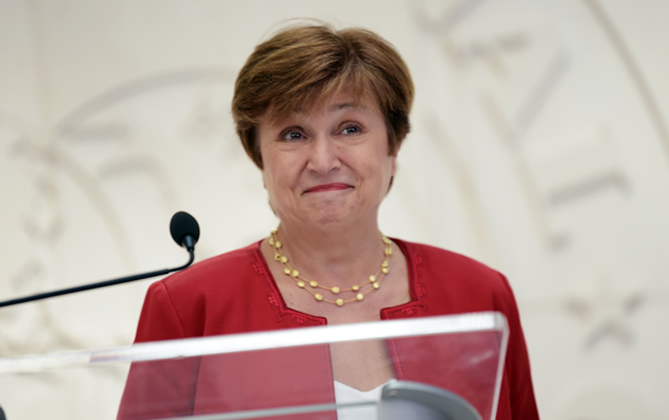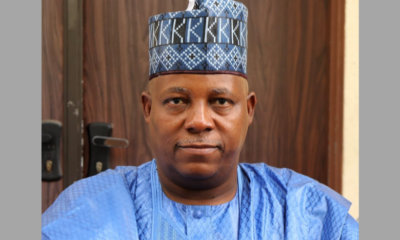Top Stories
IMF: Why We Asked Nigeria To Remove Fuel Subsidy

The International Monetary Fund (IMF) has explained why it advised Nigeria to remove fuel subsidies, adding that the subsidy regime was robbing the poor for the rich.
The Director of the African Department of the Fund, Mr. Abebe Selassie, provided insights into the organisation’s position, at the ongoing Spring Meetings of the IMF and World Bank in Washington DC. According to him, the Fund had provided robust content and how the poor could benefit from the policy in the provision of social safety nets.
His words: “Subsidies are about resource allocation internally within Nigeria. So Nigerians, the people of Nigeria pay for these subsidies.
“And what’s the reason why we counsel against such generalised subsidies is very simple. It tends to be highly regressive, meaning the benefits of such you know, fuel subsidies tend to accrue to the rich and segments to reach out to people and the poor people.
“So it’s people that are driving these large cars, with big houses are wanting to see subsidised fuel. They’re the ones benefiting relative to the poor and vulnerable in Nigeria.
“So you know, not only people paying for the subsidies Nigeria, it’s the poorest segments of society that actually are losing out and resources could instead, of course, be used to improve conditions for poorer people instead of accruing to rich people.
“That’s why subsidy reform is important. We applaud the government for the steps government took to reduce the extent of subsidies. I think as oil prices have become volatile, the level of subsidy has also moved up and down. “But I think you know, the direction of travel, I think, to remove the subsidies and use the resources to provide social protection for the most vulnerable households.”
Mr. Selassie revealed that the IMF has provided the sum of $58 billion to African countries since the outbreak of the COVID-19 pandemic and pledged it would do more.
The IMF chief cautioned African countries against commercial loans for the purposes of refinancing because of the current rate hike in most economies.
He advised that instead, countries South of the Sahara that have debt service challenges should look inward for domestic resource mobilization, which would be easier to deal with. The Director criticised the practice of discriminatory tax exemption to some companies and not extended to others.
Nigeria still paying fuel subsidy – Isa Yuguda
These special favours to some companies, he observed reduce the effectiveness of governments to optimise tax revenue..
Positive developments in Africa
“Mr. Abebe said that after four challenging years and multiple shocks, Sub-Saharan Africa’s economy appears to be on the mend.
“We expect economic growth to rise to 3.8 per cent in 2024, from 3.4 per cent last year. After peaking at almost 10 per cent in late 2022, inflation has nearly halved to around 6 per cent in the early part of the year thanks to decisive action by central banks.
“This includes slower food price increases, a positive development for a region where the cost of crises has been acute in recent years. In addition, fiscal consolidation efforts are starting to pay off, with the median public debt stabilizing at around 60 per cent of GDP, halting a 10-year upward trend.
“And with global financial conditions easing, a few countries have been able to return to international markets, ending a two-year hiatus. These are encouraging signs.”
The Missing Chief said, however, “ the region is not out of the woods yet. Far too many countries still face a funding squeeze.
What’s heart breaking about Africa- IMF MD
Also, IMF Managing Director, Mr. Kristalina Georgieva, described as “heart-breaking”, the situation in which African countries spend large amounts of their revenue on debt servicing.
Her words, “African countries spend on average, 12 percent of their revenue on on debt servicing. This is more than double from the Las decade. They were at 5 percent a decade ago.
“What is heartbreaking is that in some countries, the debt payments is up to 20 per cent of revenues.
“What does that mean? It means that what could have gone to education, health, for investments in infrastructure and jobs is being sucked away by debt servicing. The ground for public capital to come in.
“We know that part of the reason is that interest rates are quite high. So what does it translate into for authorities in Sub-Sahara Africa?
“First, we see that those who have worked on public finances, to clean clean the ground for private capital to come in are doing better.
“When you have a tax/revenue of 26 per cent like Cote d-Ivoire, you can bear the debt burden. When you 12 per cent to GDP you cannot.”
The MD said that the IMF’ major peg of interaction with member countries in the region was focusing on the mobilisation of domestic resources, improving public spending and mobilising local savings with which to achieve growth prospects.
She added that African countries must keep their eyes on inflation because that problem remains unsolved.
Ms. Georgieva noted that Africa was blessed with huge potential, with huge a youth population that was earger to work and that its leaders should allow Africa’s resources to work for Africans.


 Top Stories5 hours ago
Top Stories5 hours agoWhy Tinubu’s Administration Will Not Blame Buhari For Nigeria’s Economic Crisis – Kashim Shettima

 Business and Brands21 hours ago
Business and Brands21 hours agoErin People Find A Home In ‘Erinmoje’

 News5 hours ago
News5 hours agoSome Nigerians Don’t Want Power Sector To Work – Minister Of Power, Adelabu

 News5 hours ago
News5 hours agoBlack Market Dollar (USD) To Naira (NGN) Exchange Rate Today 3rd May 2024

 Entertainment5 hours ago
Entertainment5 hours agoTheo Somolu And Folake Olowofoyeku To Star In Disney’s ‘Mufasa’

 Top Stories6 hours ago
Top Stories6 hours agoTranscorp Group delivers impressive Q1 2024 performance; sustains revenue growth of 173% and PBT of N45 billion

 News21 hours ago
News21 hours ago‘You Are Frustrated’ – Group Slams Suswam For Criticizing Tinubu’s Govt

 Politics5 hours ago
Politics5 hours agoBuhari imposed Abdullahi Adamu on APC despite pending corruption charges – Edwin Clark





